Executive Director's message
Be the change you wish to see in the world . . . – Gandhi
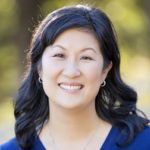
It’s Fall and the temperatures are finally cooling down after record heat this past summer. The 1Ls and new advanced degree students arrived in late August and the returning students moved back in mid-September. The beginning of the school year is always packed with a robust schedule. We immediately welcomed the new students with a series of events which included a public interest panel at Orientation; the 1L Mini-Public Interest retreat; the Road Map to Public Interest info session; a faculty panel discussing their public interest career paths before academia featuring Professors Jayashri Srikantiah, David Sklansky, and Pam Karlan; the Pro Bono Fair (see more details about that below); and a community-building lunch event for nearly 150 of our Public Interest Fellows, Associates, 2L Mentors, and 1L Mentees (PI-FAMM) pictured below. We hope to host quarterly PI-FAMM lunches to encourage more interaction among public interest students across disciplines.
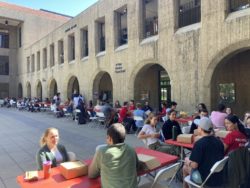
In this issue is a profile on alumna Bethany Davis Noll, JD ’05, a longtime Public Interest Alumni Mentor whose career has spanned multiple sectors and substantive areas. It was wonderful to reconnect with Bethany and hear more about her path since graduating from SLS.
Earlier this summer, the Law School hosted 20 pre-law students through our new Stanford Law Scholars Institute. Associate Dean for Public Service and Public Interest Law Diane Chin worked closely with Associate Dean for Admissions and Financial Aid Faye Deal to develop this program in 2019 and had planned to host the first cohort in the summer of 2020. Given the pandemic, we were excited to finally welcome the Scholars to campus this summer. Read more about their experiences below.
A few weeks ago, our Director of International Public Interest Initiatives, Titi Liu, co-taught an S-term course with Jamie O’Connell which included leading 2L and 3L students to South Africa. I was particularly happy to see the photos and learn that Titi also had the chance to reunite with our past SLS Global Practitioner-in-Residence Mbekezeli Benjamin (who was in residence for Spring quarter in 2019) and University of Cape Town Professor Dee Smythe, a Stanford Law School JSM and JSD graduate.
One upcoming event that I’m very excited about is our Fall Public Service Awards dinner. It will finally be returning in person! We will host current students, faculty, staff, and alumni on Monday, October 17 as we honor two outstanding public interest attorneys: Silvia Argueta and Nayna Gupta, JD ’13. This has always been one of my favorite events because we hear such inspirational advice from leaders in the field. It also gives students a chance to dress up. This is a formal sit-down dinner so you’re welcome to come in cocktail attire, business attire, or business casual if you’re coming straight from class. The Fall Dinner is a wonderful opportunity to gather together to celebrate public service so I hope you can join us. Please read more about the honorees below.

Finally, I want to make sure our alumni know that we have custom onesies that say “Public Interest rocks!” on the front and “SLS” on the back that we are happy to send to any of you expecting babies. Alisha Beltramo Schoen, JD ’09, shared this photo of her adorable twin sons in their onesies. We also still have some of our “I’m an LRAP baby” onesies left. You can see some of those photos here. Just reach out to me and let me know which onesie you want (e.g., LRAP or PI Rocks!), what size (e.g., 6 months or 12 months), and where I should mail the onesie. We love seeing photos of the latest additions to the Levin Center family!
I hope you enjoy reading about what has been happening on campus as well as news about our public interest alumni.
Sincerely,
Anna
Alum Takes Surprising Path From Russian to Environmental Law
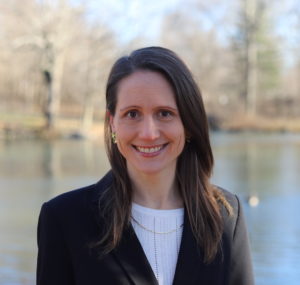
Bethany Davis Noll, JD ’05, still remembers the hike and barbecue at Meg Caldwell’s home during the beginning of her 1L year. Caldwell, now Deputy Director of Packard Foundation’s Conservation and Science program but then the director of the Environmental and Natural Resources Law and Policy Program at the Law School, opened her home for Environmental Law Society students. This event and her later experience with the Environmental Law Clinic cemented Davis Noll’s strong interest in environmental law.
Davis Noll remarked, “It was a taste of paradise. After that, I took every environmental law class I could, including water law with Buzz Thompson and pollution with Michelle Friedland (now a judge on the Ninth Circuit). I took the environmental law clinic with Debbie Sivas in my third year, and Peter Morgan [JD ’06, now a senior staff attorney with the Sierra Club] and I argued a case in the Northern District of California. The case was about EPA’s failure to regulate ballast water discharges from ships, which were a big source of pollution. A ship could dump oil along with animals (think zebra mussels) that the ship picked up in another place – spreading invasive species. We won the case and I remember listening to a radio show with Rush Limbaugh where he complained about the ‘activist judge’ who had ruled in our favor. But he was thrown off when listeners in the Midwest called in to tell him that the judge did the right thing because they were worried sick about how invasive mussels had taken over in the Great Lakes. That experience solidified my desire to become an environmental lawyer.”
Davis Noll wasn’t one of those people who knew she wanted to be a lawyer from the time she was a child. She explains, “I grew up in Venezuela, majored in Russian at Barnard College and had no lawyers in the family—probably not your typical Stanford Law student. But I found my way there after writing my college thesis on freedom of speech in post-glasnost Russia. My work on that paper led me to the research of Professor Monroe Price. He ran a center focused on comparative media law and policy, based out of Oxford and Cardozo Law School, and I went to work for him right out of college. Monroe was the first lawyer I had ever met, and working with him inspired me to consider law as a route to making the world a better place.”
Over the course of her legal career thus far, Davis Noll has worked in two different judicial chambers, a corporate law firm, state government, and an academic institution’s think-tank. When asked to share advice for current students, Davis Noll comments, “I once heard this advice and I think it is so good: your grades are how you get your job, but legal writing is how you keep your job. My advice is to spend the time you need to on your classes; don’t let yourself get pulled in too many other directions so that you can get the grades you want. Legal writing is the most important skill you need for the day-to-day life of a lawyer. Take advantage of every opportunity to practice and hone that skill.”
After graduating from Stanford, Davis Noll clerked for the Honorable Shira A. Scheindlin in the Southern District of New York and the Honorable Chester J. Straub in the Second Circuit Court of Appeals. Davis Noll then spent four years at a corporate firm before leaving to join the appeals division of the New York Attorney General’s office as an Assistant Solicitor General.
Davis Noll shares, “When I was working at Debevoise & Plimpton, I represented two environmental justice organizations in eastern North Carolina pro bono who were working to combat the pollution from large factory pig farms in the areas. Working alongside those groups, we were able to support the development of a strong cadre of community investigators who were trained in taking water samples and obtaining EPA-approved water sample results. I was so grateful to have the opportunity to learn the principles of community-led environmental justice lawyering through this work.”
She was drawn to the NY Attorney General’s office because of its impact. Davis Noll states, “AGs are the top lawyer in the state and have an incredible ability to influence policy nationwide as well as to have a direct and meaningful impact on the lives of the people of the state. As an example, at the AG’s office I worked on a case before the Supreme Court where we successfully defended an Obama-era regulation that cut emissions in upwind states so that downwind states would have cleaner air. Air pollution doesn’t respect state boundaries. At night, air pollution emitted to the south and west flows up the eastern seaboard and can pollute the air in New York and Connecticut the next day. People in New York were affected by pollution that had traveled all the way from places like West Virginia, and therefore New York’s voice in that case was crucial to EPA winning.”
After four years in the NY AG’s office, Davis Noll joined the Institute for Policy Integrity at NYU School of Law. She shared, “It was December 2016, and I was up late one night working on a Medicaid appeal, when I realized it was time to devote my life fulltime to environmental law. I went to work at a think tank run by Professor Ricky Revesz where I spent four years working on cases involving the Trump administration’s environmental rollbacks–filing amicus brief after amicus brief arguing (successfully) that the Trump administration’s rollbacks were harmful to people’s health and the environment, and that the agencies had not provided a justification that passed muster for those harms. I kept a tracker of the administration’s success rate in court, which showed a shockingly low win rate. Prior studies had shown administrations winning 70% of the time, but mine showed only a 23% win rate for the Trump administration. Reporters from the Wall Street Journal to the AP to the New Yorker called me to ask about it. Everybody wanted to know whether he was actually winning in court and the answer was no.”
Davis Noll is currently the Executive Director of the State Energy & Environmental Impact Center at NYU—a center that was founded by another SLS alumnus, David Hayes [JD ’78]. The Center supports Attorneys General pushing for strong clean energy and environmental law and policy, through fellowships as well as events. She is working closely with Gladys Limón [JD ’03] there on building a new legal fellowship program to support environmental justice advocacy at AG offices and to provide resources to community based environmental justice advocacy organizations.
She explains, “In a recent event, we hosted top appellate lawyers from Oklahoma, New York, Oregon, and West Virginia to talk about the U.S. Supreme Court’s changing docket and its impact on states and environmental law. The biggest environmental case this past term was a battle between states over how much authority EPA has to regulate greenhouse gas emissions from existing power plants. The Court sided with West Virginia in the case, limiting EPA’s ability to cut those emissions. But now we have Congress pouring money into the clean energy economy and we have more states enacting stronger climate goals. This is a moment when AGs will have the opportunity to defend strong state-level goals and policies, enforce the laws that protect people from multiple pollution sources that disproportionately impact them, and protect workers in the new renewable sector jobs from workplace abuses.”
Davis Noll adds, “I was just one lawyer working my cases when I was at the AG’s office, but now I can support many more lawyers and offices doing the work. I’m so grateful to SLS for helping put me on the path to contribute my energy to these issues in this pivotal time.”
Fall Public Service Awards Dinner Returns in Person
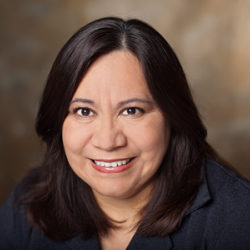
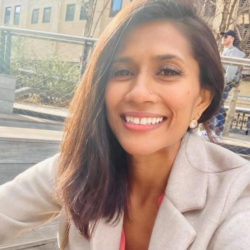
We are thrilled to resume hosting our annual Fall Public Service Awards dinner in person. We will honor two trailblazing public interest lawyers and hear remarks from Dean Jenny Martinez. Silvia Argueta, Executive Director of the Legal Aid Foundation of Los Angeles, is this year’s recipient of the National Public Service Award. She will deliver the keynote address. Nayna Gupta, JD ’13, Associate Director of Policy at the National Immigrant Justice Center, is this year’s recipient of the Miles L. Rubin Public Interest Award.
The National Public Service Award is designated for an attorney whose work on behalf of the public has had national impact, and the Miles L. Rubin Public Interest Award is given annually to a Stanford Law School graduate whose outstanding work has advanced justice and social change in the lives of vulnerable populations on a community, national, or international level. In particular, the Rubin Award is intended to highlight concrete and sustainable approaches and solutions to a societal problem.
This year’s event will be at Paul Brest Hall on Monday, October 17, 2022 starting at 5:30 pm. We invite alumni, faculty, students, and staff to join us for a formal dinner reception honoring the award recipients. Registration is required and since the official RSVP deadline has passed, interested guests can request to be added to the waitlist. Admission is complimentary for SLS alumni, faculty, students, and staff. All other guests will be asked to contribute a sliding scale donation.
Please read more about our honorees on our website.
SLS Welcomes Undergraduate Students from Around the Country for Pilot Launch of Diversity Pipeline Program
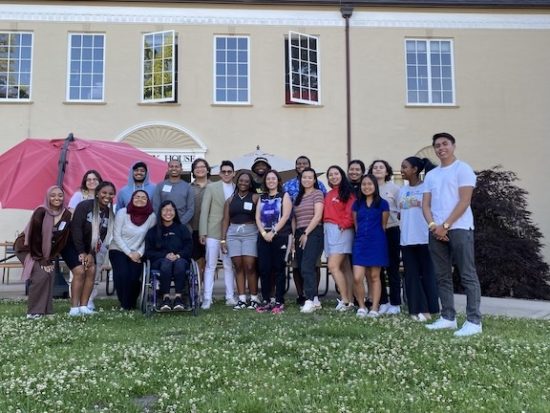
In 2018, as a result of student activism and the law school’s commitment to diversity, equity, and inclusion, Associate Deans Faye Deal and Diane Chin were tasked with creating an undergraduate diversity pipeline program to increase the number of applications from under-represented communities to law school. Building on research conducted by Professor Dan Ho surveying the available programs, and with an intention to develop further research that would allow for evaluation of program components that could have a meaningful impact, Associate Deans Deal and Chin began designing outreach strategies, curriculum, and programming that would target first-generation, low-income, and students of color who could face obstacles to the resources necessary to prepare to apply to law school and to the testing and application processes themselves.
At the end of 2019, the Stanford Law Scholars Institute was ready to launch, with an intended residential component in the summer of 2020. The program was delayed due to the pandemic shutdown. This past summer, we were finally able to offer a pilot program for 20 students. Tirien Steinbach, the law school’s Associate Dean for Diversity, Equity, and Inclusion, joined the program design and training team in 2021.
The residential and ongoing training program is designed on building blocks that support the individual development of each Scholar as well as giving them information and knowledge related to key aspects of the law school application process and law school success. Each Scholar is paired with another as a peer coach. For the first year, we also provided a SLS graduate coach for ongoing support.
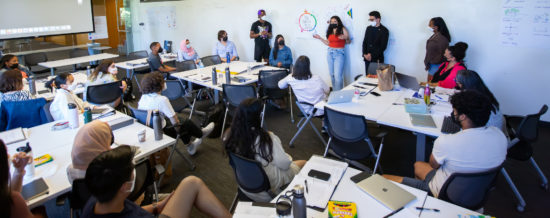
In the pilot year, 20 Scholars were selected. Fifteen identify as first-gen/low-income. Seven are African American, 5 Asian American, and 6 Latinx. Six participants are immigrants and several more are the children of immigrants. They represent schools and states from almost all parts of the country.
Chin shared, “Our 20 amazing young people arrived in fits and starts from their travels across the country and the world on June 19th. We told them we wouldn’t start formal programming until everyone had arrived and they were free to explore the campus or to just rest after their trips. They started bonding immediately. Faye, Tirien, and I were primarily outside the house where they would stay, awaiting the arrival of the rest of the cohort, and helping to manage the vaccination verification and mandatory COVID testing process. At some point, we heard robust talking and laughter coming out of the house. They had self-organized some icebreakers and were fully enjoying themselves, building community. The first night was amazing, over dinner joined by Professors Bob Weisberg and Diego Zambrano, with deep introductions and a facilitated process to create community norms and communications agreements. We were on the right path.”
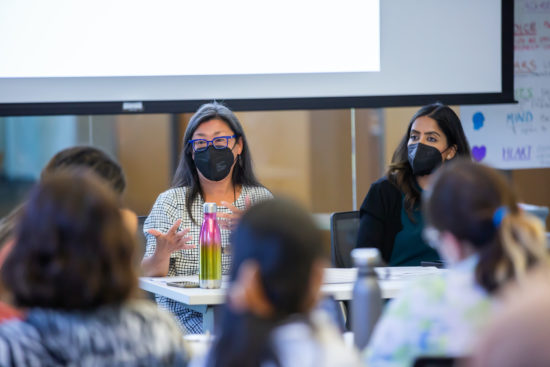
The second day, they were entirely engaged, committed to learning, fully participatory, and clearly already a bonded group. Professors Jayashri Srikantiah and Shirin Sinnar provided an overview of the US legal system. Along with Shafaq Khan, Assistant Director of the Levin Center’s Public Interest Career Development Program, Chin provided training on growth mindset. Associate Dean Deal started to introduce the law school application process. Associate Dean Steinbach provided an overview of IRAC.
A heat wave started, but the Scholars were game for outdoor lunches with guest speakers, such as Associate Dean Susan Robinson and Office of Student Affairs Associate Director Holly Parrish, as part of our COVID protocols. Then, on the third day, a nearby fire created a full power outage across the Stanford campus in the afternoon just as Professor Rabia Belt was completing her overview of criminal law. We shuffled around the programming and found a space with enough windows to provide light to continue. It was about 97 degrees outside.
The fourth day rolled out without knowing if there would be any power. There was not, and one member of the cohort tested positive for COVID. We relocated her to isolation housing. We had had a plan for moving to a hybrid teaching format, but that actually required electricity, which we did not have. They and we rolled with it and found shaded spots outdoors to continue with our programming and training, including with Professor Eric Jensen providing an overview of international law and rule of law. They just kept expressing gratitude that somehow we were making it all work, even as they had just experienced another night living in a house without electricity.
Day five arrived. There was still no electricity and the housing situation became untenable. Fire alarm backup batteries were running out, electronic readers for key fobs could no longer work that got them into their housing. We had to shut the program down and send them home early.
Chin explains, “Faye, Tirien, and I apologized profusely, noting how incredibly resilient they had been. To a one, they were gracious and grateful, wanting to take advantage of every single moment of being together and being with us. One of our closing, small group exercises was to create a t-shirt design that we would use to create a memorable gift that we will send them later. One group drew an impressive logo with the name of the program (Stanford Law Scholars Institute) and the phrase ‘learning about the power within,’ to reference that they had been without power, but also what they had learned about themselves. Another created an image of a tree, with a root system that described the core values they held (based upon another exercise), with branches and leaves that included all of their names and created a catchphrase that we were a ‘community rooted in kindness.’ All of them were remarkable. In our rushed closing ceremony (not at all what we had designed), our participant from Kenya said that his already large family now had 24 additional members. Another said that even if the entire program had just consisted of 30 minutes with each of the program leads and being able to meet the other members of the cohort, it would have been invaluable.”
The pilot program is now under review for further improvements. We will initiate the application process for the second year in early 2023. Ultimately, we hope to expand the program and build in an evaluation process that will be conducted by Professor Dan Ho.
Titi Liu and Jamie O'Connell Teach Students on the Role of Law and Lawyers in South Africa
Earlier this fall, the law school’s Lecturer in Residence Jamie O’Connell and the Levin Center’s Director of International Public Interest Initiatives, Titi Liu, co-taught an S-Term course on the role of law and lawyers in South Africa’s democratic transformation. Students returned to campus two weeks early for the fall quarter and met on campus for a week, with three hours of discussion, collaborative exercises, and some lecturing daily. The following weekend they flew to Cape Town, where they spent a week learning through discussions with a range of South Africans including judges, policymakers and public interest attorneys.
South Africa’s transition to democracy in 1994 marked the formal end of the comprehensive political, economic, and social system of racial subordination known as apartheid. The country has changed dramatically since then, as the government has built several million new housing units, created social welfare systems, and created an array of government and private sector programs to combat discrimination and redress the effects of subordination. Yet the country remains among the most unequal in the world, with 64% of black South Africans living below the poverty line, compared to 1% of whites. Most non-white South Africans receive poor education, live in substandard housing, and have limited employment opportunities.
In recent years, discontent with the pace of economic and social transformation has boiled over. In 2015, university campuses erupted in protests. Students’ demands quickly expanded from the removal of statues of white colonizers to wider “decolonization” of university faculty and curricula and the expansion of access to higher education. “Born-free” student activists are now calling for faster, more radical transformation not just of campuses but of the society as a whole; many denounce what they see as the Mandela generation’s overly conciliatory approach to white privilege in the economy, society, and interpersonal relations.
The course focused on how lawyers are struggling for social justice and economic and social transformation—sometimes through ambitious arguments using South Africa’s highly progressive constitution, but more often by supporting social movements day to day. The learning was grounded in specific cases, such as of the shack-dwellers movement Abahlali baseMjondolo; Equal Education, an organization of high school-age students; and pioneering class actions on behalf of injured gold miners. These cases enabled students to explore various ways law and lawyers fit into social change, the challenges and rewards of such work, and how their perspectives overlap with and diverge from those of their clients. At the same time, they drew connections between this work and the role of law and lawyers in US social movements.
One of the students in the course, David Schafer, JD ’24, reflected, “Meeting and conversing with many accomplished lawyers, as well as non-lawyers, who embody the progress I hope to advance provided a much-needed reminder that my education is both only one part of what I hope will be a long career and the foundation on which that career will rest. I hope that law students, disaffected or not, and non-law students alike have the privilege I had to visit Cape Town and directly confront the issues and questions we considered. I am forever grateful for this opportunity–thank you.”
Photos from the Trip to South Africa
Pro Bono Program Expands to 21 Student-Led Projects
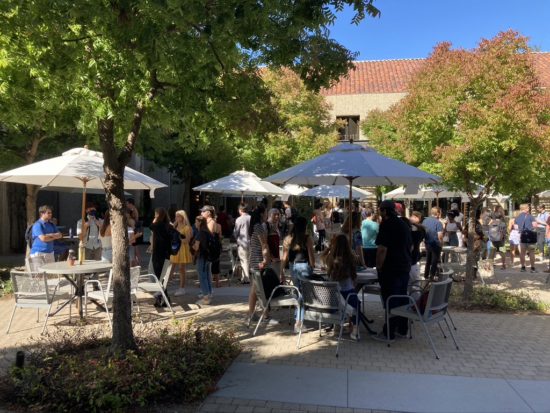
This year, about 80% of the incoming class joined Student-led Pro Bono Projects. At the September 23rd Pro Bono Fair (pictured at left), 2L and 3L student leaders presented on their respective projects, leading 176 incoming students (1Ls, Advanced Degree students, and transfers) to apply for placement in the 21 projects. Read more about all the pro bono projects on our website.
Two new projects will commence this year, including the Family Defense Pro Bono Project in which law students will provide family law guidance to criminal defendants to ensure they understand the collateral consequences of the criminal legal system. Another new project is the Education Justice Academy Pro Bono Project, in which law students provide support and guidance (under lawyer supervision) to a cohort of current board of education members and candidates for boards of education.
SLS Public Interest Alumni in the News
We like to share news of our SLS Public Interest alumni. Please feel free to forward links for us to include in future issues.
Jared Pettinato, JD '04
Jared Pettinato, JD '04, is featured in this article discussing the lawsuit he filed against the U.S. Census Bureau to try and enforce voting rights under Section 2 of the 14th Amendment.
Emily Rong Zhang, JD '16/PhD '22, David Hausman, JD '15/PhD '20, and Andrew Baker, JD '17/PhD '21
Former Skadden Fellows Emily Rong Zhang, JD '16/PhD '22, and David Hausman, JD '15/PhD '20, have both joined the faculty at UC Berkeley School of Law. Zhang worked with the ACLU’s Voting Rights Project and Hausman worked with the ACLU's Immigrants’ Rights Project. Another SLS alum, Andrew Baker, JD '17/PhD '21, also joined Berkeley Law as an assistant professor. Before joining Berkeley Law, Baker was a Research Fellow with the Rock Center for Corporate Governance at Stanford.
About Create Change
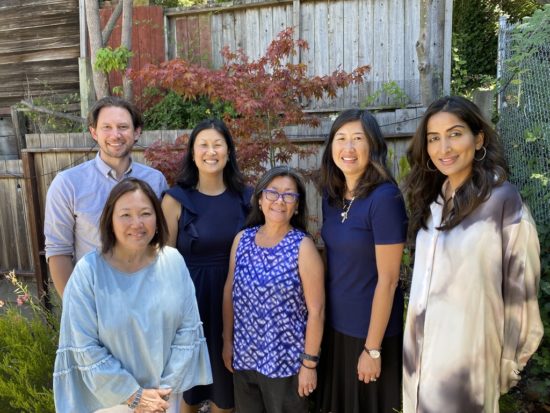
Create Change is designed and produced quarterly by the staff of the John and Terry Levin Center for Public Service and Public Interest Law. Unless specifically noted, all articles are written by staff:
Associate Dean for Public Service and Public Interest Law: Diane T. Chin
Executive Director: Anna Wang
Director, International Public Interest Initiatives: Titi Liu
Director, Pro Bono and Externship Programs: Mike Winn
Assistant Director, Public Interest Career Development Program: Shafaq Khan
Program Manager: Melanie Stone
Research Assistant: Noelle Andrew, BA ’24
To be notified when new issues of the newsletter are available, please visit this website.
Create Change is published via email and past issues are available on our website. Articles, letters, and photos are welcome. Please send them to public.interest@law.stanford.edu.
You can visit us on the web at:
law.stanford.edu/levin-center
www.facebook.com/levin-center



